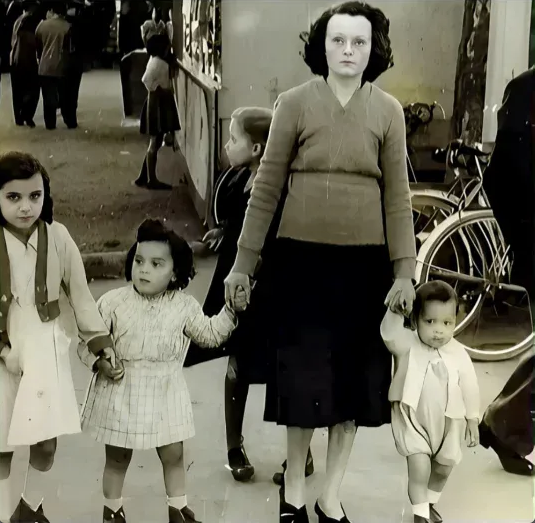
The photograph is black and white, faded with time, but the image is clear: a young woman stands in wartime France, holding the hands of her three children. Her expression is calm, steady, resolute. She looks like an ordinary mother navigating an ordinary day. But there was nothing ordinary about what Elisa was doing.
She was part of the French Resistance.
While Nazi soldiers patrolled the streets, while checkpoints divided free zones from occupied territories, while fear hung over every conversation and every movement, Elisa carried secrets. Coded messages were hidden in her hair, sometimes sewn into the lining of her clothing. She walked past German soldiers with her children at her side, her face neutral, her steps measured. She could not afford to tremble. She could not afford to hesitate.
If they searched her, if they discovered what she was carrying, she would be arrested. Likely killed. Her children would be left alone. But the Resistance needed someone who could move undetected, someone the Nazis would overlook. And Elisa understood that sometimes, the most dangerous work falls to those who appear the least threatening.
Once, after she helped destroy a bridge that the Nazis needed for their supply lines, soldiers came looking for her. They hunted through the town, searching homes, interrogating neighbors. But the locals hid her—inside barrels, beneath floorboards, anywhere they could think of—until the danger passed. They risked their own lives to save hers, because they knew what she was risking for all of them.
She never asked for recognition. She never told her story as if it made her special. To her, it was simply what had to be done. The Nazis were destroying her country, and she had the ability to fight back. So she did.
Elisa lived to be 96 years old, passing away peacefully in 2021. She raised her children, watched them grow, met her grandchildren and great-grandchildren. She lived a long, quiet life after the war—the kind of life she had fought to make possible.
Her grandchild, sharing her story now, wants the world to know: this woman, who looked so ordinary in that photograph, was extraordinary. She carried courage deeper than fear. She chose resistance over safety. She walked past armed soldiers with secrets in her hair and determination in her heart.
Because of people like Elisa, generations exist today. Because of her courage, families were reunited, messages reached their destinations, and small acts of defiance added up to something larger than any single person.
Heroes don’t always wear uniforms. They don’t always carry weapons. Sometimes they look like young mothers walking through occupied towns, holding their children’s hands, carrying the weight of the world in a strand of coded paper hidden in their hair.
And sometimes, they live to be 96, never asking for recognition—only doing what had to be done.